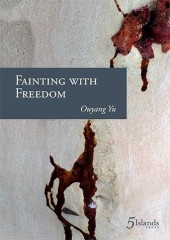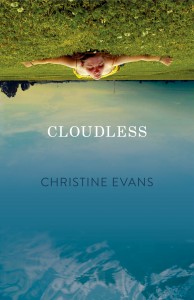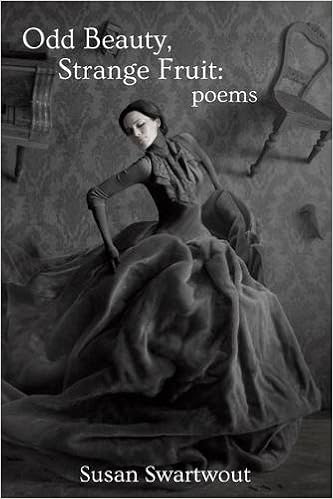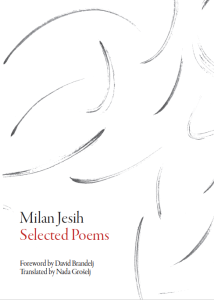 Though the narrative presents a fast-paced story of ambulance, medication, confusion and return, we’re in the realm of poetry, which can be dream-like, with a multitude of simultaneous meanings. The poems operate on several levels at once, from the struggles of a failed body and its attempts to come back from the nightmare of motor neurone degradation, to the writer’s daily struggle to make sense of language and the self against an increasingly incomprehensible world.
Though the narrative presents a fast-paced story of ambulance, medication, confusion and return, we’re in the realm of poetry, which can be dream-like, with a multitude of simultaneous meanings. The poems operate on several levels at once, from the struggles of a failed body and its attempts to come back from the nightmare of motor neurone degradation, to the writer’s daily struggle to make sense of language and the self against an increasingly incomprehensible world.
Category: Poetry Reviews
A review of Word Migrants by Hazel Smith
 Hazel Smith’s Word Migrants is a poetry collection that is utterly relevant right now. Smith brings her cross-media poetic aesthetics to such topics as racism, the plight of refugees, diaspora, stereotypes, climate change, grief, aging and death, semiotics and literary theory all in a way that weaves and intersects seamlessly. Though there’s a neat circularity in the book – starting and ending with disappearances, Word Migrants is organised into five sections, each with a slightly different focus. The first, “The Forgiveness Website”, focuses on the nostalgia and sense of loss that comes with displacement. This chapter explores refugees and migration, but also the motion from past to present, and of all that we lose in our identities as we try to find ways to live and forgive in the face of oppression.
Hazel Smith’s Word Migrants is a poetry collection that is utterly relevant right now. Smith brings her cross-media poetic aesthetics to such topics as racism, the plight of refugees, diaspora, stereotypes, climate change, grief, aging and death, semiotics and literary theory all in a way that weaves and intersects seamlessly. Though there’s a neat circularity in the book – starting and ending with disappearances, Word Migrants is organised into five sections, each with a slightly different focus. The first, “The Forgiveness Website”, focuses on the nostalgia and sense of loss that comes with displacement. This chapter explores refugees and migration, but also the motion from past to present, and of all that we lose in our identities as we try to find ways to live and forgive in the face of oppression.
A review of Strange Theater by John Amen
.jpg) John Amen’s Strange Theater lives up to its name in that it is a strange book. Most of the poems are written to people we do not know. It appears that they are friends or acquaintances of the author but we are not sure about this. It also appears that he haphazardly throws words together to make sentences that do not make sense but somehow are able to tell a story. In this way, Amen reminds me of Federico Garcia Lorca.
John Amen’s Strange Theater lives up to its name in that it is a strange book. Most of the poems are written to people we do not know. It appears that they are friends or acquaintances of the author but we are not sure about this. It also appears that he haphazardly throws words together to make sentences that do not make sense but somehow are able to tell a story. In this way, Amen reminds me of Federico Garcia Lorca.
A review of Everyday Epic by Anna Kerdijk Nicholson
 Kerdijk Nicholson’s poems are not difficult to read: they flow in straightforward rhythms, and take on familiar landscapes and territories, but the poems in Everyday Epic are much more complex then they seem at first glance. It is through the everyday moments of such universal elements as love, grief, work, that we find the epic, and in those old stories of conquest and domination, where we find our most shameful and least ‘epic’ natures.
Kerdijk Nicholson’s poems are not difficult to read: they flow in straightforward rhythms, and take on familiar landscapes and territories, but the poems in Everyday Epic are much more complex then they seem at first glance. It is through the everyday moments of such universal elements as love, grief, work, that we find the epic, and in those old stories of conquest and domination, where we find our most shameful and least ‘epic’ natures.
A Review of Seven by Antonio J. Hopson
 During the Crusades, European priests kissed cannons, by way of blessing them, as soldiers marched east to fight what was perceived as the threat of Islam. Instead of cannons, Antonio J. Hopson uses words as his weapon of choice in the poetry collection Seven, and that for the most part focuses on a love affair. “I am a poet. I use words” (Mr. Law, 31). Amazingly, his use of words gives the impression that this affair—at least for him—resembles the carnage of the Crusades.
During the Crusades, European priests kissed cannons, by way of blessing them, as soldiers marched east to fight what was perceived as the threat of Islam. Instead of cannons, Antonio J. Hopson uses words as his weapon of choice in the poetry collection Seven, and that for the most part focuses on a love affair. “I am a poet. I use words” (Mr. Law, 31). Amazingly, his use of words gives the impression that this affair—at least for him—resembles the carnage of the Crusades.
A review of Fainting with Freedom by Ouyang Yu
 Time and again, the poetry confounds expectations and unpicks itself, structurally, grammatically, and linguistically, presenting what looks like a story, a letter, a footnote, a telegram, a Wikipedia entry, a diary entry, or even a simple poem about a single thing, only to undo the stereotype, the perception, or the form, through a reworking of its conventions.
Time and again, the poetry confounds expectations and unpicks itself, structurally, grammatically, and linguistically, presenting what looks like a story, a letter, a footnote, a telegram, a Wikipedia entry, a diary entry, or even a simple poem about a single thing, only to undo the stereotype, the perception, or the form, through a reworking of its conventions.
A review of Cloudless by Christine Evans
 The voice of the playwright is obvious in Christine Evan’s verse novel Cloudless. A rich blend of characterisation, setting, and powerful thematic weaving from poem to poem, the novel takes us deep into the heart of working class Perth in the 1980s. Each of the eight key voices who make up the story are on the cusp of something: their lives about to change.
The voice of the playwright is obvious in Christine Evan’s verse novel Cloudless. A rich blend of characterisation, setting, and powerful thematic weaving from poem to poem, the novel takes us deep into the heart of working class Perth in the 1980s. Each of the eight key voices who make up the story are on the cusp of something: their lives about to change.
A review of Review of Odd Beauty, Strange Fruit by Susan Swartwout
 From Louisiana to Honduras, Susan Swartwout covers much ground in her poetry collection, Odd Beauty, Strange Fruit. The collection is billed as a gothic take on Southern culture, and in some aspects it is, but there is more here than meets the eyes or first reading. The collection also tells a family’s history and the impact of this on the life of the individual who tells it.
From Louisiana to Honduras, Susan Swartwout covers much ground in her poetry collection, Odd Beauty, Strange Fruit. The collection is billed as a gothic take on Southern culture, and in some aspects it is, but there is more here than meets the eyes or first reading. The collection also tells a family’s history and the impact of this on the life of the individual who tells it.
A review of IV (50 ‘I’ Statements) by Basil Eliades
 Beyond the mistakes and the failings of humans which are highlighted in these poems, there is something that redeems us. We can, and must, love, and transcend. IV is a collection poetry about the ephemeral nature of life, of pain, about how we learn, grow, become mindful/present/enlightened, and above all, about love. No matter how much we’ve severed, sutured, eluded and deconstructed, love is always transformative.
Beyond the mistakes and the failings of humans which are highlighted in these poems, there is something that redeems us. We can, and must, love, and transcend. IV is a collection poetry about the ephemeral nature of life, of pain, about how we learn, grow, become mindful/present/enlightened, and above all, about love. No matter how much we’ve severed, sutured, eluded and deconstructed, love is always transformative.
A review of Selected Poems by Milan Jesih
 Jesih is from Slovenia. Natural aspects of this country, along with the author’s own thrust toward existential questions, serve to inform the poems in the book. He takes notes while walking, while reflecting, and brings the reader along for the journey. One gets the sense from his poetry that Jesih is a peripatetic wordsmith.
Jesih is from Slovenia. Natural aspects of this country, along with the author’s own thrust toward existential questions, serve to inform the poems in the book. He takes notes while walking, while reflecting, and brings the reader along for the journey. One gets the sense from his poetry that Jesih is a peripatetic wordsmith.